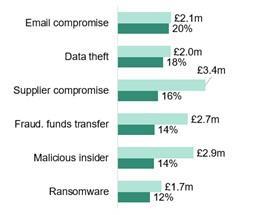Businesses need to adopt a robust risk mitigation strategy and perform diligent horizon scanning when adopting new technology.
More than a quarter (27%) of global business leaders believe that technology obsolescence – when a product or service is not useful anymore compared to newer technology – is the biggest digital threat impacting their organisations this year, according to new research by specialist insurer Beazley.

Its risk resilience report: spotlight on cyber and technology 2024, which surveyed 3,500 business leaders and insurance buyers across the UK, US, Canada, Singapore, France, Spain and Germany, further found that 24% of respondents are unprepared when it comes to managing the pace of technological development.
The report stated: “The advent of new technologies continues at an unprecedented pace, hardly giving businesses time to absorb and adopt one new transformative technology before another comes along.
“Businesses need to adopt a robust risk mitigation strategy and perform diligent horizon scanning when adopting new technology.”
“While it can be tempting to rush to adopt new transformative technology to gain a competitive advantage, businesses need to adopt a robust risk mitigation strategy and perform diligent horizon scanning when adopting new technology.
”Worryingly, our data shows that perceived cyber risk preparedness has dropped from 80% in 2022 to 75% this year.”
Beazley’s research additionally revealed that 25% of respondents planned to invest in artificial intelligence (AI) to improve their risk resilience, while 68% are concerned that AI will ultimately replace jobs at their company.
The insurer also noted that AI was increasingly being used by hackers to execute more sophisticated cyber attacks – for example, deepfakes. A deepfake is a fake image, video or recording that uses AI to make it appear real.
Key research findings
- 27% of global business leaders feel exposed to tech obsolescence challenges ranking it as their top risk now, with 28% anticipating this exposure to continue in 2025
- Their concern over cyber risk is dropping – with 26% ranking this as their top risk, compared to 34% in 2021. Yet, perceived cyber risk preparedness is down to 75% compared to 80% in 2022.
- 24% plan to invest in cyber security this year and plan to explore insurance options that include risk and crisis management services.
- A quarter (25%) believe AI and other disruptive technologies are the biggest risk they face this year.
- AI is seen as a popular way to build business resilience, with 25% planning to invest in it this year, and 68% believing that AI will lead to jobs being replaced in their company.
- IP risk continues to rise up their risk agenda, with 23% ranking this a top concern, up from just 11% in 2021, and a quarter (25%) feel unprepared to manage IP risks.
What next for businesses and their risk managers?
Innovation walks hand in hand with risk. While the advent of new technologies, such as AI, offers the opportunity to streamline operations and increase efficiency, it also presents significant risk.
The pace of innovation can leave firms exposed to risk linked to tech obsolescence, more sophisticated phishing attacks, and accusations of bias in new AI systems. Staying ahead of the curve has never been more important.
As the world digitalises and moves into the cloud, businesses are being targeted by cyber criminals through their suppliers. With cyber criminals favouring the path of least resistance, the need for businesses to assess their third party relationship vulnerabilities is increasingly important.
Commenting on the report findings, Paul Bantick, global head of cyber risks at Beazley, said: “With technological innovation set to bring about seismic societal change, the growing regulatory burden for firms [is] becoming more and more sophisticated [and] businesses are facing a wave of new threats.”
“Elevated risk requires elevated resilience and firms need to be on the front foot and use all the tools at their disposal to defend against a cyber incident”
Bantick added that, as a result of this landscape, “the need for robust risk mitigation strategies has never been greater”.
He continued: “Insurance can play an important role. By leveraging the vast amount of claims, incident and threat information data we have and translating that into actionable guidance and advising on elevated ‘always on’ resilience for a range of cyber and technology risks, we can help clients to better navigate the risks they face today.”
However, while insurance can provide an important safety net, no business is immune to the threat posed by cyber crime.
Elevated risk requires elevated resilience and firms need to be on the front foot and use all the tools at their disposal to defend against a cyber incident. Businesses can work with insurers to help build resilience and improve their cyber security.














No comments yet